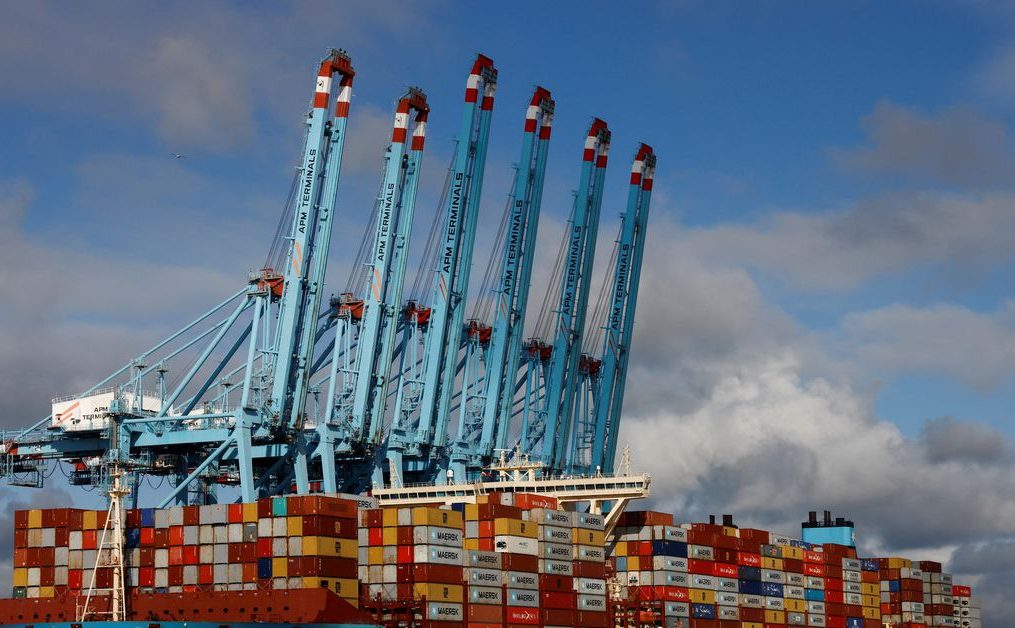Maersk sees FY profits at lower end of range; to cut 10,000 jobs
- Signals sharp downturn in demand
- To review share buyback program for 2024
- Says industry facing overcapacity and lower prices, demand
- Shares down 17.5% to lowest in three years
COPENHAGEN, Nov 3 (Reuters) – Shipping group A.P. Moller-Maersk (MAERSKb.CO), reported a steep drop in third-quarter profit and revenue on Friday and said it would cut at least 10,000 jobs in the face of overcapacity, rising costs and weaker prices, sending its shares tumbling.
Maersk, which controls about one-sixth of global container trade, transporting goods for a host of major retailers and consumer goods companies such as Walmart and Nike, flagged a steeper downturn in demand than analysts and investors had expected.
“The new normal we are now headed into is one of more subdued macroeconomic outlook, and thus soft volume demands for the coming years, prices back in line with historical levels, inflationary pressures on our cost base, especially from energy cost, and also increased geopolitical uncertainty,” CEO Vincent Clerc said on an investor call.
The industry invested heavily in new container ships during and after the pandemic to meet strong demand and benefit from record freight rates. A large number of new ships entered the market since the summer with no signs of idling or scrapping, said Clerc.
“If the fourth quarter does not deliver some type of improvements, then I think we’re looking at a pretty dire situation in 2024,” he said.
Negative revenue growth in the third quarter came mainly from the retail and lifestyle sector, especially in North America, as well as automotive and technology, Clerc said.
[1/2]Containers are seen on the Maersk’s Triple-E giant container ship Majestic Maersk, one of the world’s largest container ships, next to cranes at the APM Terminals in the port of Algeciras, Spain January 20, 2023. REUTERS/Jon Nazca/File photo Acquire Licensing Rights
Shares in the Copenhagen-based group slid to their lowest level in three years, trading 17.5% lower by 1141 GMT.
Jyske Bank analyst Morten Holm Enggaard said the share price was hit by Maersk saying it would reconsider whether to continue its share buy-back program into 2024.
“The only way we can read it, is that we have to look into something very bad in 2024, and probably worse than what we had expected,” said Enggaard.
Maersk said it expects global container volumes in its ocean business, its largest segment, to fall by up to 2% this year, primarily as a result of weak consumer demand and destocking by firms following the scramble for goods in the aftermath of the coronavirus pandemic.
Maersk, which employed 110,000 in January, said it was in the process of cutting its workforce to below 100,000 which will result in savings of $600 million next year and beyond compared to this year.
The company kept its full-year guidance for revenue and operating profit but now expects both to land at the lower end of the range.
Operating profit dropped to $1.9 billion in the third quarter from $10.9 billion a year earlier. Revenues fell 47% to $12.1 billion.
Reporting by Jacob Gronholt-Pedersen and Louise Rasmussen, additional reporting by Johannes Birkebaek editing by Terje Solsvik, Miral Fahmy, Elaine Hardcastle
Our Standards: The Thomson Reuters Trust Principles.
Based in Copenhagen, Jacob oversees reporting from Denmark, Iceland, Greenland and the Faroe Islands. Specializes in security and geopolitics in the Arctic and Baltic Sea regions, as well as large corporates such as brewer Carlsberg and shipping group A.P. Moller-Maersk. His most impactful reporting on Arctic issues include a report on how NATO allies are slowly waking up to Russian supremacy in the region, uncovering how Greenland represents a security black hole for Denmark and its allies, and how an abundance of critical minerals has proven a curse for Greenland.
Before moving to Copenhagen in 2016, Jacob spent seven years in Moscow covering Russia’s oil and gas industry for Dow Jones Newswires and The Wall Street Journal, followed by four years in Singapore covering energy markets for WSJ and Reuters. As a Russian speaker, he has been involved in covering the war in Ukraine. He publishes a newsletter each weekday focused on the most important regional and global news. Contact Jacob via email if you are interested in receiving the newsletter.
